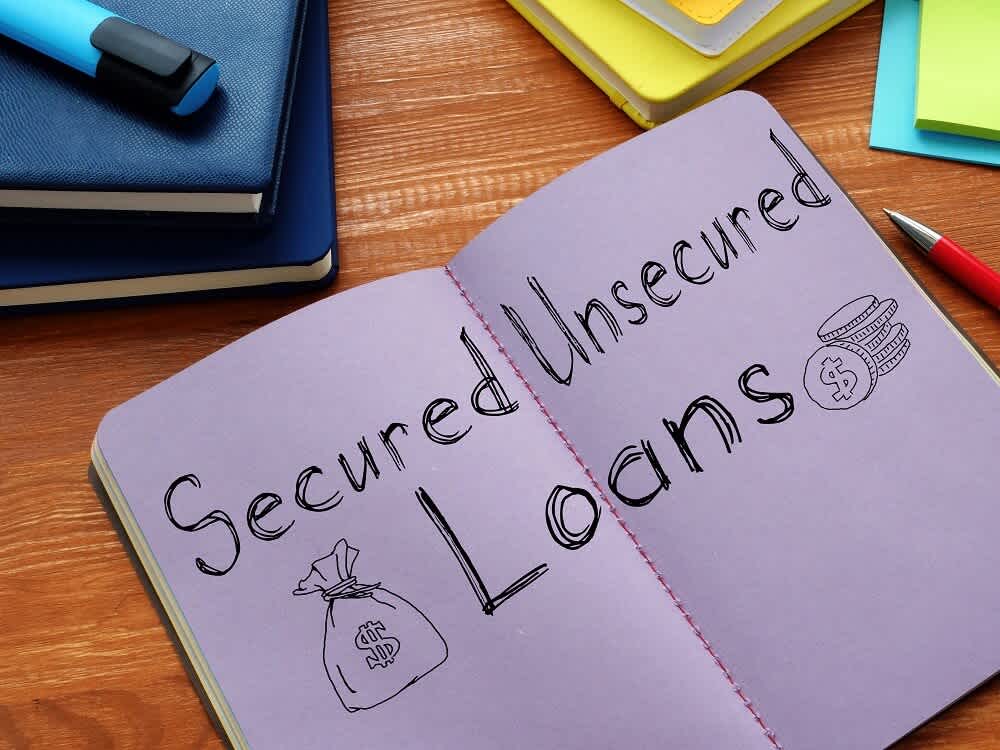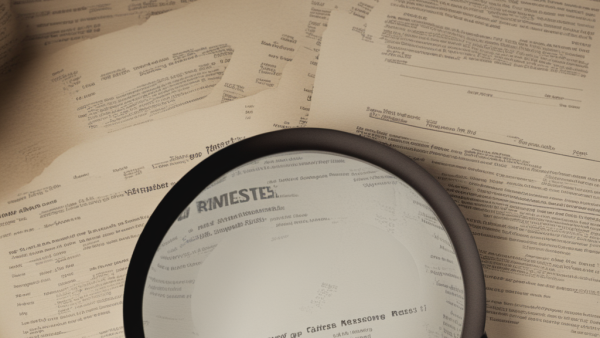
by James Hickson | March 21, 2022 | 12 min read
Unsecured business loans: the right choice for your business?
Get fundedLast updated: April 18, 2022
Most businesses need to borrow money at some point, whether they are just starting out or have been established for many years. It’s important to know about the different lending options available, and one of these options is an unsecured business loan.
But what exactly are they, and why might they be a suitable option for your business? Here we take a deep dive into unsecured business loans to give you all the information you need.
Table of contents
- Unsecured business loans: an overview
- How unsecured business loans work
- Secured vs. unsecured business loans: key differences
- The pros and cons of unsecured business loans
- How to qualify for a business loan
- Approval times for loans
- Always compare loans
- The impact of having a bad credit record
- Revenue-sharing agreements
- Conclusion
Unsecured business loans: an overview

With an unsecured loan, there is no need to secure the loan against your company assets like property and equipment, meaning you have no risk of losing them.
As such, it’s a flexible way to get access to funding if your business does not have assets or you simply don’t want to use any assets as security.
Unsecured loans are typically simple, straightforward, and accessible. They can also be used for a wide range of purposes, such as buying new equipment, dealing with unexpected costs, or boosting your cash flow.
How unsecured business loans work
Unsecured business loans are quite straightforward:
Find a lender of unsecured business loans and apply for a loan.
Once your application is approved, you will receive the agreed amount of money without the need to provide any security.
The loan amount with any interest is paid back in instalments, either monthly or quarterly, for the term of agreed-upon.
The specifics of the loan will differ from lender to lender, including:
The length of the term.
The interest rates.
The amount you can borrow.
Sometimes, you may only be able to borrow a relatively small amount like £5K. But the loan amount could be a lot higher, with lenders providing loans of up to £250K and more. The loan is often anything up to 36 months, but again this will differ from lender to lender.
The type of loan you are given, and the loan terms will depend partly on your business type. For example, there are different loans for startups, sole traders, and limited companies.
But if there is no security with this type of loan, what do the lenders require? They may ask for a personal guarantee, which we’ll look into next.
What are personal guarantees?

When you apply for an unsecured business loan, you don’t need to offer any assets as security. However, if you run a limited company or limited liability partnership (LLP), stakeholders or directors with a large stake in the business may be asked to provide a personal guarantee (PG).
This consists of a written promise from the business owner, or an executive or director, that guarantees the loan will be repaid if the business cannot make the payment.
This is not tied to an asset, but it is a legal agreement. The person who makes the personal guarantee is personally liable for paying the debt if the business cannot make the repayment. They, therefore, become the guarantor of the loan.
The personal guarantee can differ. For example, some lenders will want security, while other lenders may not require this.
Paying back the loan
When you take out a loan, it’s important to know how you will be expected to pay it back. This will depend on the terms set out by the lender. They are usually quite straightforward.
You will usually borrow the money from the lender and agree to pay it back in monthly instalments at an agreed-upon fixed interest rate.
The payments will be made over a set period of time, which is called the loan term. You will know exactly how long it takes to pay back and how much you will pay back in total, including the interest, so you can prepare accordingly.
Secured vs. unsecured business loans: key differences

The difference between unsecured and secured business loans is quite simple. As already mentioned, an unsecured loan is not backed by any business assets. A secured loan, on the other hand, is backed by assets, called security.
This security can take different forms. Property is a common security, as is business equipment and land. If you fail to make the payments on time, the lender then has the possibility of seizing the assets that were used as security.
There are several other differences to keep in mind:
Interest rates
One of the key differences is that unsecured loans are riskier for the lender. As such, the interest rates tend to be higher than secured loans.
Complexity
Unsecured loans are often simpler because there is no need to deal with asset valuations. This typically makes them quicker to arrange.
If you need a loan and want to take it out sooner, this could be beneficial.
Loan amount
As well as the cheaper interest rates, secured loans often provide higher loan amounts.
Again, this is because the risk is lower to the lender, and they can take the risk of lending more money.
Consider both options
It’s impossible to say which type of loan is better because it all depends on what is most suitable for your business at a particular time.
An unsecured loan may be ideal if you need a small loan quickly. But a secured loan might be more suitable if you want a larger loan and a better interest rate.
Always be clear about what you need, then compare different options.
The pros and cons of unsecured business loans
Potential benefits of unsecured business loans

Before looking at the advantages, you must consider that there is no right option. Only you and your business can decide which type of loan is most suitable in your current situation.
That being said, there are potential benefits that should be considered.
Speed
An unsecured loan can be a suitable way to get a quick cash injection without going through the process of offering an asset.
As soon as you have been approved for the loan, you will receive the funds quickly. It can take as little as a few hours. There is typically less paperwork involved in the process because there is no need to get the asset valued.
As such, you may be able to take out a loan to meet an immediate need for your business. This makes it an accessible funding source.
Less risk
There is no risk of losing an important business asset like your property or equipment with an unsecured loan, so using this type of loan is a way to keep your assets safe.
Flexible
While repayment terms differ from lender to lender, you may find that you can arrange to pay back the loan over anything from a few months to five years.
You can also use the loan for almost any purpose relating to your business, such as investing in marketing, equipment, new products or training.
Straightforward
There is not a great deal of complexity in unsecured loans, making them easy for most business owners to consider.
Interest rates are agreed in advance, fixed repayment schedules are clear, and no hidden costs are usually involved.
Suitable for all types of businesses
Whether your business is just starting out or has been established for many years, this type of loan is suitable for any business.
Disadvantages of unsecured business loans

There are also disadvantages to consider when weighing up your loan options.
Smaller loan amounts
As mentioned already, there is a greater risk to the lender with this type of loan. Therefore, they are often less likely to agree to larger loans.
If you want a larger loan, you might need to offer security. Having said that, you can still get fairly sizable loans depending on the lender.
Higher costs
Interest rates tend to be higher, which is nearly always the case with unsecured loans. Again, it comes down to the risks involved for the lender.
How to qualify for a business loan
Whether your business will qualify for an unsecured loan or not depends on various factors. The lenders will all have their own rules about who can get a loan, but the following factors are usually important:
Time spent trading
The lender will usually state a minimum period of time that you will have had to be trading as a business. This will normally be a few months, so it might be difficult to get a loan if you have only just started out.
Turnover
Lenders will often have a minimum annual turnover requirement as well. This could be around £10K, but it will depend on the lender.
Credit history
Even when you don’t have to secure the loan against an asset, you may still need a good credit history.
Documentation
There will nearly always be documentation that you have to provide to have your loan application accepted. This could include proof of identity, address, and bank statements, which will vary depending on the lender.
Location
Your business must usually be based in the UK if you want to take out a loan from a UK-based lender.
Approval times for loans
One of the advantages of unsecured business loans, as previously mentioned, is that they are often quick to take out. They are easier to arrange compared to secured loans.
But how long does approval take?
Again, it depends on your circumstances and the lender. Often, however, you can arrange to get a loan in as little as a few days. Sometimes you can receive funding on the same day.
Always compare loans

Whatever type of loan you want for your business, comparing loans is always important. There are lots of lenders out there, and some will be more suitable for your business than others.
But you won’t know if you just go with the first one you find. You may find that you can save a considerable amount of money by choosing a more suitable lender for your business.
When it comes to comparing lenders and loans, there are some important factors to consider:
The reputation of the lender
Try to find out whether the lender has a good reputation. You may want to consult with other businesses they have lent to in the past and find out whether they have any bad reviews, which is easily done online. You could also ask other business owners if they can recommend a lender.
The interest rate
A major factor in any type of comparison is the interest rate charged on the loan. All lenders have different rates, and a higher interest rate can cost your business more.
The length of the term
You may want a long term or a shorter term for your loan. Different lenders will often provide a selection of options.
The amount of the loan
Some lenders may only provide a small loan, which may not be enough for your needs.
Find out what your options are once you know exactly how much you require.
Approval time
How long it takes to get the loan approved is another factor. If you need the money quickly, you may want to go with a lender who can provide a same-day loan.
Additional fees
As well as the interest rate, find out whether there are any additional fees involved, including arrangement fees, early repayment fees, overpayments, etc.
The impact of having a bad credit record

One thing that can affect your loan application is if you have bad credit. If you have a poor credit score, it can be more difficult to get a loan.
Lenders will usually carry out a credit check before they agree to lend your business money. This can be a soft or hard check, and they are important because they help the lender determine the amount of risk involved in lending money.
If you are a business owner with a bad credit history, this does not mean you cannot get a loan. Sometimes it could be a simple problem to fix.
You may want to look at your credit history before applying for a loan because there may be something you can do to improve it. It also gives you a better idea about whether you will be eligible for a loan or not before you make an application.
Revenue-sharing agreements
There are other types of unsecured financing you can get that are different from unsecured loans.
For example, at Bloom, we use an innovative revenue-sharing agreement to provide up to £10M in unsecured capital.
The business pays back the amount as a percentage of daily credit and debit card sales. So if you take out financing, you only pay us back when you get paid. There is no interest rate, just a flat daily fee, and you can pay less if you make the repayments sooner.
This is not a loan. Instead, it’s an agreement to share revenue based on a transparent daily fee adjusted according to risk. The money is paid back as a percentage of your sales. So if business is quiet, you pay less. You then keep paying until the capital and the fee is repaid without any fixed repayment period.
And as well as not having to provide security, you also don’t give up control of your business like you would with venture capital, so it is another option worth considering if you are currently looking for business finance.
Conclusion
Unsecured business loans are often used to get financing for many reasons. There is a lot to consider when you take out an unsecured loan, but it can be a suitable option if you do not want to or cannot use business assets as security.
Hopefully, this guide will help you decide whether they are right for you or whether a secured loan or financing like a revenue-sharing agreement is best for your business.
Written by
James Hickson is the CEO and Founder of Bloom Financial Group, the winner of numerous industry awards – most recently recognized as FinTech CEO of the year as well as Payment Service of the year by AI Global Media.
Bloom is a European Fintech company focused on small to medium business lending. With their proprietary technology, Bloom offers e-commerce and retail brands access to revenue based funding (between 25,000 EUR and 3M EUR).


